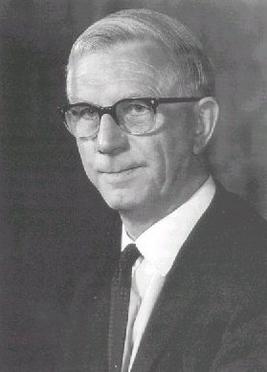Charles Oatley (nonfiction): Difference between revisions
(Created page with "Sir Charles William Oatley OBE, FRS[1] FREng (14 February 1904 – 11 March 1996) was Professor of Electrical Engineering, University of Cambridge, 1960–1971, and developer...") |
No edit summary |
||
| (One intermediate revision by the same user not shown) | |||
| Line 1: | Line 1: | ||
Sir Charles William Oatley OBE, FRS | [[File:Sir_Charles_Oatley.jpg|thumb|Charles William Oatley.]]'''Sir Charles William Oatley''' OBE, FRS FREng (14 February 1904 – 11 March 1996) was Professor of Electrical Engineering, University of Cambridge, 1960–1971, and developer of one of the first commercial scanning electron microscopes. He was also a founder member of the Royal Academy of Engineering. | ||
He was born on Valentine's Day, February 14, 1904. | |||
He was educated at Bedford Modern School and St. John's College, Cambridge. He was a director of the English Electric Valve Company from 1966 to 1985. | |||
In 1969 he was elected to the Royal Society. | |||
Oatley also received an Honorary Doctorate from Heriot-Watt University in 1974. In that same year, he was knighted. | |||
He received an Honorary Degree (Doctor of Science) from the University of Bath in 1977. He retired from the English Electric Valve Company in 1985. | |||
He was awarded the Howard N. Potts Medal in 1989. He died on 11 March 1996. | |||
Oatley and the graduate students he supervised made substantial contributions, particularly to the development of the scanning electron microscope (SEM). | |||
<blockquote>A project for a Ph.D. student must provide him with good training and, if he is doing experimental work, there is much to be said for choosing a problem which involves the construction or modification of some fairly complicated apparatus. I have always felt that university research in engineering should be adventurous and should not mind tackling speculative projects.</blockquote> | |||
== In the News == | |||
<gallery> | |||
</gallery> | |||
== Fiction cross-reference == | |||
* [[Crimes against mathematical constants]] | |||
* [[Gnomon algorithm]] | |||
* [[Mathematics]] | |||
== Nonfiction cross-reference == | |||
* [[Haroon Ahmed (nonfiction)]] - Doctoral student | |||
* [[Edward Victor Appleton (nonfiction)]] - Academic advisor | |||
* [[Alec Broers (nonfiction)]] - Doctoral student | |||
* [[John D. Cockcroft (nonfiction)]] - Influence | |||
* [[Thomas Everhart (nonfiction)]] - Doctoral student | |||
* [[Mathematician (nonfiction)]] | |||
* [[Colin J. R. Sheppard (nonfiction)]] - Doctoral student | |||
* [[Constance Tipper (nonfiction)]] - Influenced | |||
External links: | |||
* [https://en.wikipedia.org/wiki/Charles_Oatley Charles Oatley] @ Wikipedia | |||
[[Category:Nonfiction (nonfiction)]] | |||
[[Category:Engineers (nonfiction)]] | |||
[[Category:Inventors (nonfiction)]] | |||
[[Category:People (nonfiction)]] | |||
[[Category:Physicists (nonfiction)]] | |||
Latest revision as of 09:52, 11 February 2018
Sir Charles William Oatley OBE, FRS FREng (14 February 1904 – 11 March 1996) was Professor of Electrical Engineering, University of Cambridge, 1960–1971, and developer of one of the first commercial scanning electron microscopes. He was also a founder member of the Royal Academy of Engineering.
He was born on Valentine's Day, February 14, 1904.
He was educated at Bedford Modern School and St. John's College, Cambridge. He was a director of the English Electric Valve Company from 1966 to 1985.
In 1969 he was elected to the Royal Society.
Oatley also received an Honorary Doctorate from Heriot-Watt University in 1974. In that same year, he was knighted.
He received an Honorary Degree (Doctor of Science) from the University of Bath in 1977. He retired from the English Electric Valve Company in 1985.
He was awarded the Howard N. Potts Medal in 1989. He died on 11 March 1996.
Oatley and the graduate students he supervised made substantial contributions, particularly to the development of the scanning electron microscope (SEM).
A project for a Ph.D. student must provide him with good training and, if he is doing experimental work, there is much to be said for choosing a problem which involves the construction or modification of some fairly complicated apparatus. I have always felt that university research in engineering should be adventurous and should not mind tackling speculative projects.
In the News
Fiction cross-reference
Nonfiction cross-reference
- Haroon Ahmed (nonfiction) - Doctoral student
- Edward Victor Appleton (nonfiction) - Academic advisor
- Alec Broers (nonfiction) - Doctoral student
- John D. Cockcroft (nonfiction) - Influence
- Thomas Everhart (nonfiction) - Doctoral student
- Mathematician (nonfiction)
- Colin J. R. Sheppard (nonfiction) - Doctoral student
- Constance Tipper (nonfiction) - Influenced
External links:
- Charles Oatley @ Wikipedia
